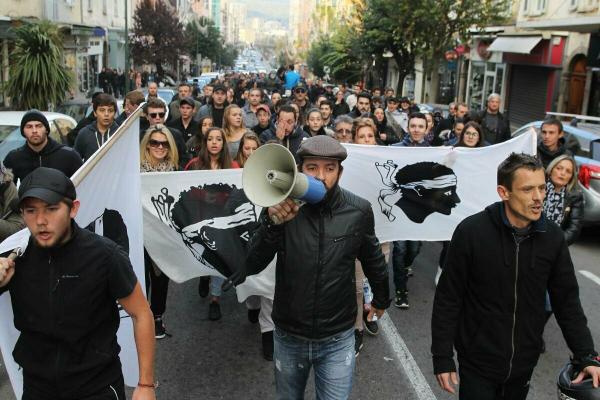Once under Italian rule, Corsica has long been a territory yearning for independence.
Throughout its history, the island has experienced numerous rebellions, starting with its resistance against Genoan sovereignty. In 1764, the Treaty of Compiègne allowed France to station troops in Corsica's key locations and address the insurrections on behalf of Genoa. French military administration, established following the occupation, lasted until 1789 when the National Assembly declared Corsica's union with France. Despite this, various autonomist movements emerged, some resorting to terrorism, which persisted even after Corsica was granted special status as an autonomous region (collectivité territoriale) in 1982. The quest for independence, however, is far from over, with tags of AFF (acronym to say: “French out of Corsica”) all over the place, and with new recent rebellions.
On March 2, 2024, violent clashes erupted in Bastia, Corsica, between police and around 200 nationalists during a protest demanding more rights for Corsican freedom activists. Protestors hurled rocks and other projectiles at the police, who responded with teargas and baton charges. The protest marked the second anniversary of the death of Yvan Colonna, a prominent Corsican militant serving a prison sentence for his involvement in various terrorist activities. Colonna was killed in prison during a fight with an Islamist inmate, allegedly over a perceived insult to Mohammed.
The day before, on March 1, 2024, Corsican prosecutors announced an investigation into the possible "apology of terrorism" by the Corsican nationalist youth group Ghjuventu Indipendentista (Independent Youths). The group is allegedly responsible for distributing leaflets advocating the continuation of the independence struggle and endorsing the FLNC as the organization to achieve Corsican independence.
On February 29, 2024, French Interior Minister Gerald Darmanin engaged in talks with Corsican representatives about the possibility of increased autonomy for Corsica within France. This dialogue followed a proposal by French President Emmanuel Macron in September 2023 to grant Corsica some autonomy, reversing previous French policy. However, the FLNC has rejected these talks, continuing its campaign of violence, including a bombing on February 8, 2024, targeting a house under construction in Santa Lucia di Moriani. Since the beginning of 2024, several bombings have primarily targeted tourism-related buildings and second homes owned by French citizens.
Following the riots on the second anniversary of Yvan Colonna's death, Corsica appears to be entering a new phase of its independence movement, with radicals increasingly taking their cause to the streets rather than relying on parliamentary negotiations. With the FLNC rejecting the autonomy talks between Corsican authorities and the central French government, the island is likely to see a surge in violent activities by the FLNC as it pursues independence from France. This violence will likely target government and police buildings, as well as tourism-related areas and non-native second homes.
The issue of granting autonomy to Corsica remains contentious, with many politicians opposing any compromise on what they consider to be the unity of the Republic. Despite President Macron's promise to deliver legislation for Corsican autonomy by March 2024, the French nationalist and right-wing populist party Rassemblement National (RN) has leveraged the situation to gain votes, particularly in the South of Corsica, where they secured a relative majority with 31% of the votes (39% island-wide). However, RN representative Jean-Philippe Tanguy has declared that Corsican independence will not happen, despite promises of economic and territorial autonomy.
The situation leaves Corsican citizens disillusioned, raising the question: Are Corsicans prisoners in their own land? Though they are French by law, this status was never the result of a democratic decision in their history.






